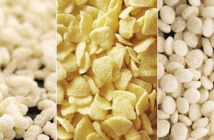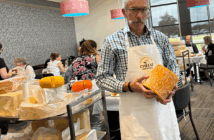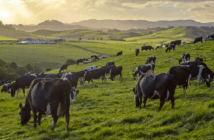A circular economy is a systemic approach to economic development designed to benefit businesses, society, and the environment. It is regenerative and aims to gradually decouple growth from the consumption of finite resources.
Since 2002, the Pact Group has been a driver of the circular economy through reuse, recycling, and packaging solutions. The Pact Group employs over 6000 people and has over 8000 customers. The group is an ASX listed company that is the largest provider of returnable produce crates in Australia and New Zealand. Its annual product output is approximately 11 billion units. It is a future-facing company that is constantly evolving to find ways to grow business whilst lowering the footprint businesses place on the environment.
The company’s contribution to the circular economy involves three divisions within the company. Pact Packaging works with companies of all sizes to create recycled packaging solutions. Industries include dairy, FMCG, health and personal care, and industrial. With 110 operating sites globally, and a commitment to the inclusion of 30% of recycled material in their packaging, they lead the field in sustainability in their category.
Pact Reuse has created a solution to single-use packaging, and works with major food producers and supermarkets to help them reach their sustainability goals. They have replaced 150 million single-use boxes with 5 million plastic crates. The business also recycles many millions of clothing hangers and manufacture waste bins for councils.
Pact Recycling is at the cutting edge of plastics recycling and partners with governments to maximise the reuse of waste. The output of this feeds the other two divisions.
Pact has grown through acquisition. This presents challenges for the business as each site it acquired had its own legacy suppliers and procurement systems, with little data around spending patterns. This created inefficiencies across the business and ultimately cost the company time and money. These circumstances certainly applied to Pacts MRO procurement where they were purchasing a multitude of products across numerous suppliers. This made standardisation and site-level compliance problematic, and economies of scale difficult to achieve, as managing pricing across a vast number of SKUs was challenging and pre-negotiated pricing benefits were non-evident.
By onboarding RS Components, Pact has moved away from manual procurement processes with its associated inefficiencies to a centralised automated replacement. RS Components eProcurement system allows for detailed analysis around MRO spending, which creates value for Pact. This approach means that spending across each site is visible, it eliminates leakage on a sitewide basis which means that Pact now has standardised pricing and discount levels on SKU’s across all sites nationally allowing for continuity around pricing.
Responses to procurement inquiries are now down to 1 day, and as RS Components eProcurement system is predictive, it can ensure that stock is available in localised warehouses as opposed to being housed in its UK headquarters. This means that Pact has faster access to stock with delivery times cut from an average of 7 days down to 1. All this has led to significant savings for Pact, with further benefits as the system is further refined.
The Pact Group and RS Components have formed a partnership that will streamline Pact’s MRO procurement, delivering efficiencies around purchasing, fulfillment, and sales analysis. This will further Pact’s objective of driving the circular economy.




























































































